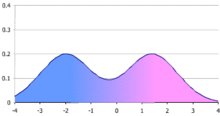(Wye River) The sagacious Nate Silver thinks that the odds slightly favor a Republican victory in the 2012 presidential race, and that’s partly because if Mitt Romney wins the nomination, the GOP nominee will be a relative moderate. Silver thinks a moderate Republican nominee would perform about 4 percentage points better than a hard-right nominee would, and that could easily be the edge.
It’s not that most voters are moderates, but rather that a moderate candidate stands as close as possible to the majority of people. This is not always true, but it can apply even when voters are polarized. In the following hypothetical distribution, few of the voters are moderates, yet a mildly right-of-center candidate would draw all of the conservatives plus some of the moderates and could win. At least, he would do better than a hard-right candidate who would cede more moderates to the Democrat:

My question is whether Romney would get the advantages of being perceived as a moderate. He’s an unusual case, with a record of strongly–even passionately–endorsing opposite positions when he runs for different offices. If he’s very lucky, that could work out as the functional equivalent of moderation. Perhaps voters will average out his various positions and conclude that he’s really a moderate. Or perhaps people will mainly notice the positions Romney has taken that they happen to like. Instead of being placed in the middle of the spectrum, a shape-changing candidate could appear near every individual voter’s position on that voter’s own map. That would be even better than moderation.
But if Romney isn’t so lucky, he could see the opposite result. Everyone could remember the positions Mitt has taken that are different from their own. Then Romney would be the opposite of a moderate. Instead of standing in the middle–reasonably close to everyone–he would emerge as everyone’s enemy.
I would guess that the reality will be a mix of the two. I think stories like this one in the Washington Post will make conservatives think Romney is no ally without persuading moderates and liberals that he is a friend: a costly result. But the conservatives won’t have any other option, and some moderates will buy Romney’s conciliatory rhetoric during the general election campaign. The question is not whether Romney is a better GOP candidate than Perry or Cain (who are astoundingly weak), but whether he is as much better as the “moderate” label would suggest.